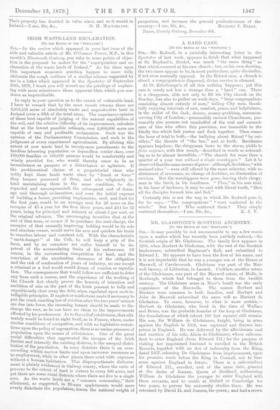MR. GLADSTONE'S SCOTTISH ANCESTRY.
go THE EDITOR OF THE "SPECTATOR.'] Sin,—It may possibly be not unseasonable to say a few words upon a matter which has recently been publicly noticed,—the Scottish origin of Mr. Gladstone. The family first appears in 1296, when Herbert de Gledestan, with the rest of the Scottish landowners, subscribed Bagimont's Roll, and submitted to Edward I. He appears to have been the first of his name, and it is not improbable that he was a younger son of the House of Maxwell, of Caerlaveroch. Cledstane was part of the Max- well barony, of Libberton, in Lanark, Cocklaw, another estate of the Gledstanes, was part of the Maxwell estate, of Molle, in Roxburgh, which had belonged to them from the twelfth century. The Gledstaue arms (a Moor's head) was the early cognisance of the Maxwells. The names Herbert and Eustace were common to both families, and Herbert and John de Maxwell subscribed the same roll as Herbert de Gledestan. To come, however, to what is more certain,— Herbert de Gledestan, who lived in the time of Wallace and Bruce, was the probable founder of the keep at Gledstane, the foundations of which (about 100 feet square) still remain His son, Sir William de Gledstanes, knight, being in arms against the English in 1356, was captured and thrown into prison in England. He was delivered by the affectionate zeal and exertion of his wife, Alicia do Gledstanes, whose safe-con- duct to enter England (from Edward III.) for the purpose of visiting her imprisoned husband is enrolled in the British Records, together with an Act of indemnity from the King, dated 1357, releasing De Gledstanes from imprisonment, upon his promise, made before the King in Council, not to bear arms against England in future. There is a safe-conduct of Edward III., enrolled, and of the same date, granted at the desire of Joanna, Queen of Scotland, authorising William de Gledstane the younger to enter England with three servants, and to reside at Oxford or Cambridge for two years, to pursue his university studies there. Ho was esteemed by David II. and Joanna, his queen ; and had a crown
grant of several estates in the viscounty of Peebles, which is enrolled in the Scottish records. He also was a knight, and died about A.D. 1400.
James de Gledstanes, his son and heir, figures in the history of Scotland in connection with the raid of the Earl of North: umberland and Hotspur, immediately before the battle of Shrewsbury, 1404. After the fatal battle of Homildon Hill, Gledstane, as his duty required, had fortified and garrisoned his Border Castle of Cocklaw (long since destroyed), and ap- pointed a gallant captain, named Grymslaw, to the command. He also was present, to inspirit the garrison. The great English host of the Percies invaded Scotland by way of Cock- law, and besieged the castle, long, fiercely, and ineffectually. They at last agreed to allow six weeks for the relief of the castle by Scotland. The Scottish historians (and especially Forduu) have given a graphic account of the agitation of Robert In, and the march of the Regent Albany to the relief of Cocklaw, when it was discovered that Hotspur was slain, and Northumberland a fugitive. Gledstane seems to have been unrewarded.
After this, the Gledstanes were divided into two branches, of which the Roxburghshire lino became subdivided into numerous families of small importance. The elder lino of Gledstane, of that ilk, appears chiefly in Galloway, but still survived in 1722. From a younger branch, which possessed lands in Quothquhan, adjoining Gledstanes, in the time of James VI. and Charles I., derived a John Gledstane, whose three sons settled as merchants in the adjoining town of Biggar, where their descendants still remain. Mr. Gladstone is the great-grandson of one of three brothers, who was born in 1694. In the seventeenth century, one of this race, George Gledstanes, preacher at St. Andrew's, was raised to the dignity of Archbishop of St. Andrew's and Primate of Scotland, by James IV., in 1606. His lot was cast in times of violent controversy, but he left behind him the reputation, attested by Spottiswood, of "a man of good learn- ing, ready utterance, and great invention."—I am, Sir, &c.,
INDAGATOR.







































 Previous page
Previous page